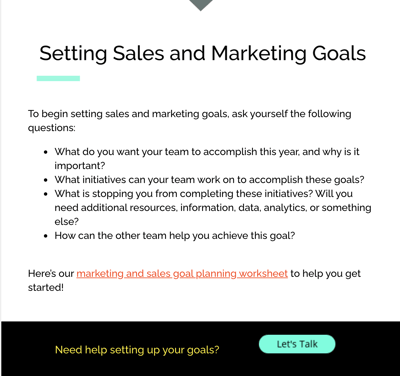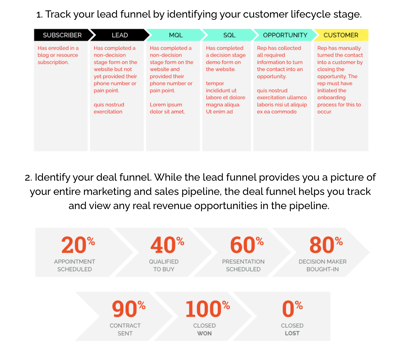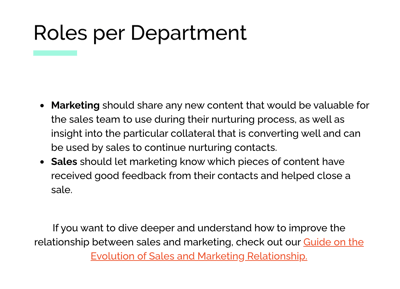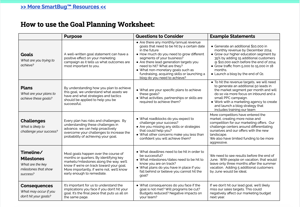Sales and Marketing Bootcamp

If you feel your sales and marketing teams are continually struggling to set goals that they can reach (or even exceed), the goals your teams have set probably aren’t aligned. Marketing might be focused on long-term goals centered on building brand awareness, growing market share, and nurturing leads. Meanwhile, sales has set short-term goals meant to reach quotas, develop the pipeline, and close deals quickly.
The ultimate goal is to create space for marketing and sales teams to work together. This might look like agreeing on a lead management process, setting criteria for a sales-qualified lead (SQL), and collaborating on marketing-qualified lead (MQL) scores, for instance. Better yet, they’ll take the time to develop common goals and regularly check in on those goals.
With our bootcamp, you’ll learn:
- How to set SMART (specific, measurable, achievable, relevant, and timely) sales and marketing goals
- How to develop a sales-level agreement (SLA) and facilitate sales and marketing alignment meetings
- How to support and boost your content marketing efforts through sales enablement
- How to effectively hand off leads from marketing to sales



Resources you will find in this Bootcamp:
Disclaimer: There is more than one resource per week, here are some (not all) that you will find during the course of the three weeks.
Marketing and Sales Goal Planning Worksheet
This worksheet comes in a ready-to-use template in Google Sheets that you’ll be able to copy and fill out with your own data.
This worksheet is in a Google Doc format.

Advanced Lead Scoring Model Template
This template comes in a Google sheet format for you to copy and create your own. With it you'll be able to go beyond basic lead scoring with a model that applies value to fit the engagement categories of your prospective audience.

Growth Through M&A: Blending Sales + Marketing for Success
Access one of our most watched on-demand webinars of all time! "Growth through M&A: Blending Sales + Marketing for Success," offers an in-depth look at the role of sales and marketing in M&A success. With a panel of industry experts, we'll explore strategies to overcome common hurdles and maximize value from your M&A activities. Don't miss this opportunity to elevate your M&A strategy to the next level!

Agile Planning for Remote Teams Template
This offer includes several resources to help you run remote sales and marketing alignment meetings.

The Definitive Guide to HubSpot & Salesforce Integration

Think of the relationship between sales and marketing like the relationship between a baseball pitcher and catcher: They need each other to work together and achieve success—and without either of them, the team is incomplete.
Why is sales and marketing alignment important?
Sales and marketing alignment is crucial for the success of any business. Here are a few reasons why:
- Better communication: By aligning their efforts, sales and marketing teams can improve communication. This gives both teams a better understanding of what the other is doing and how they can work together to achieve common goals.
- Improved lead management: When sales and marketing work together, they can create a seamless process for lead generation and follow-up. This can help ensure that leads are properly qualified and nurtured, resulting in higher conversion rates and better ROI.
- Increased revenue: Working together, sales and marketing can create more effective campaigns, reach more potential customers, and close more deals. This ultimately leads to increased revenue for the business.
- Better customer experience: By aligning sales and marketing efforts, any business can make the customer journey smoother and more seamless. This can improve the overall customer experience and encourage customer loyalty.
How do I align sales and marketing?
Here are some key steps you can take to align your sales and marketing departments:
- Establish common goals: Bring the sales and marketing teams together to discuss common goals, such as lead generation, increased brand awareness, and revenue growth. Establishing shared objectives helps align both teams around what truly matters.
- Improve communication: Encourage ongoing communication between the two teams to share insights, identify potential roadblocks, and collaborate on campaigns and projects. Hold regular meetings to discuss progress and address any issues.
- Develop a shared language: Create a shared glossary of common terms and metrics that both teams will use to measure success. This helps ensure that everyone is on the same page and that data is being interpreted consistently across teams.
- Create a sales enablement program: Marketing can help the sales team by providing sales collateral, lead generation campaigns, and content to help salespeople close deals. This ensures sales team members have the tools they need to succeed.
- Use technology: Implementing a CRM system can help sales and marketing align their efforts because they will have access to the same data and can track leads through the sales funnel. Additional tools such as marketing automation software can also help streamline lead generation.
This guide walks you through these steps, which will help you align your sales and marketing teams to create a more effective and efficient business operation.
How do I set sales and marketing goals?
Setting sales and marketing goals is a crucial step in achieving success. Here are some tips:
- Define your overall business goals: Before setting sales and marketing goals, it's important to define your overall business goals. This will help you ensure that your sales and marketing goals align with your overall objectives.
- Identify your target audience: Knowing your target audience helps you set specific sales and marketing goals. Determine what motivates your potential customers to make a purchase. If you haven’t already, it’s important to create buyer personas.
- Determine key performance indicators (KPIs): Identify the metrics that will help you measure the success of your sales and marketing efforts, such as conversion rates, lead generation, website traffic, and more. Also, be sure to have clearly defined definitions for terms such as sales qualified lead (SQL), marketing qualified lead (MQL), and sales accepted lead (SAL).
- Set SMART goals: Make sure your goals are specific, measurable, achievable, relevant, and time-bound. This will ensure that your goals are meaningful and achievable.
- Create an action plan: Once you have set your goals, create an action plan with specific steps you will take to achieve those goals. Develop a timeline and set deadlines for each task to keep on track.
Remember that regularly tracking progress and adjusting your strategies can help you achieve your sales and marketing goals.
Can I use this sales and marketing resource if I am not a SaaS marketer?
Yes! There are a few resources in the bundle that may not pertain to your business. However, this resource will give you a general overview of how to align your sales and marketing teams; some areas may just need to be tailored specifically to your company and industry.
How will you use my personal information?
We may use or disclose the personal information we collect for one or more of the following business purposes: To provide you with information, products, or services that you request from us. To provide you with email alerts, event registrations, and other notices concerning our products, services, events, and news that may be of interest to you. To carry out our obligations and enforce our rights arising from any contracts entered into between you and us, including for billing and collections. To carry out our obligations and enforce our rights arising from any contracts entered into with our clients. To improve our website and present its contents to you. For testing, research, analysis, and product development. As necessary or appropriate to protect the rights, property, or safety of us, our clients, or others. To respond to law enforcement requests and as required by applicable law, court order, or governmental regulations. As described to you when collecting your personal information or as otherwise set forth in the CCPA.
We will not collect additional categories of personal information or use the personal information we collected for materially different, unrelated, or incompatible purposes without providing you notice.
Ready to boost revenue from marketing and close more deals through sales and marketing alignment?
Fill out the form below and enroll in our bootcamp.